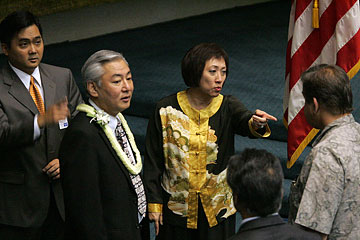LEGISLATURE WRAPUP

CRAIG T. KOJIMA / CKOJIMA@STARBULLETIN.COM
Senate President Colleen Hanabusa and Sen. Les Ihara, in lei, were among those gathering yesterday on the chamber floor at the end of the 2007 session. CLICK FOR LARGE
|
|
Young, White and unwanted
The finished session is notable for rejection of Lingle nominees
[ ANALYSIS ]
The 2007 Legislature ended with House and Senate members holding hands and singing, but the session will most be remembered for the two people not there: Iwalani White and Peter Young.
The Senate Democrats handed Republican Gov. Linda Lingle her first two Cabinet nomination defeats as the Senate rejected the appointments of White as public safety director and Young as land and natural resources director.
Senate critics said White, a former first deputy prosecutor and Family Court judge, did not have the temperament to run the state department in charge of Hawaii's prisons and jails.
Young's nomination was more controversial, as Lingle staged a news conference with prominent supporters of Young ranging from environmental and native Hawaiian groups to major land and business interests.
Senators, however, said Young was to blame for the department's poor performance and said he should have done more to inspect dams across the state before the 2006 dam break on Kauai that killed seven.
The rejection is still reverberating among Hawaii environmentalists.
Yesterday, Jeff Mikulina, Sierra Club director, said his members and others in the environmental community "are still very upset about it. ... We lost a good leader ... not only because of the ultimate vote, but the process and how they did it."
Senate President Colleen Hanabusa sought to downplay the differences in the confirmation process, saying yesterday in her closing-day speech that the Senate confirmed nearly 400 Lingle nominees to various boards and commissions.
Speaking of the Water, Land and Agriculture Committee, which rejected Young, Hanabusa said it "did an amazing job."
"They should not be faulted. The media may not agree, but that doesn't make what they did any less important or the decision of the Senate wrong," Hanabusa (D, Nanakuli-Makua) said.
Hanabusa also defended the Senate as GOP critics said the $49 million in tax cuts were progressive and aimed to help moderate- and low-income taxpayers.
Senate GOP leader Fred Hemmings (R, Lanikai-Waimanalo) had said the tax credits will be hard for the poor to claim.
"You think the poor living in tents in Waianae have the wherewithal to fill out a tax return; I don't think so," Hemmings said.
House Democrats touted the passage of the budget, for dealing primarily with the needs of housing, health care and education.
"We remained committed to the theme that we started out with in making Hawaii more affordable for all our residents," said House Majority Leader Kirk Caldwell (D, Manoa). "We provided meaningful tax relief for those who are hanging on by their fingernails -- the lower 60 percent."
The 19-week session ended in the House with an emotional moment for veteran House Speaker Calvin Say.
Members twice gave Say a standing ovation, acknowledging his work this year while also dealing with the death of his mother in February and his father last month.
"In spite of that ... you looked out for the welfare of the House, and not your own personal welfare and feelings, and for that, Mr. Speaker, a job well done," said Speaker Emeritus Joe Souki (D, Waihee-Wailuku).
An emotional Say (D, Palolo-St. Louis Heights) thanked members.
"They have given me the strength to carry out the duties of this position," he said. "My mom and dad are watching me from heaven."
Star-Bulletin reporter B.J. Reyes contributed to this story.

